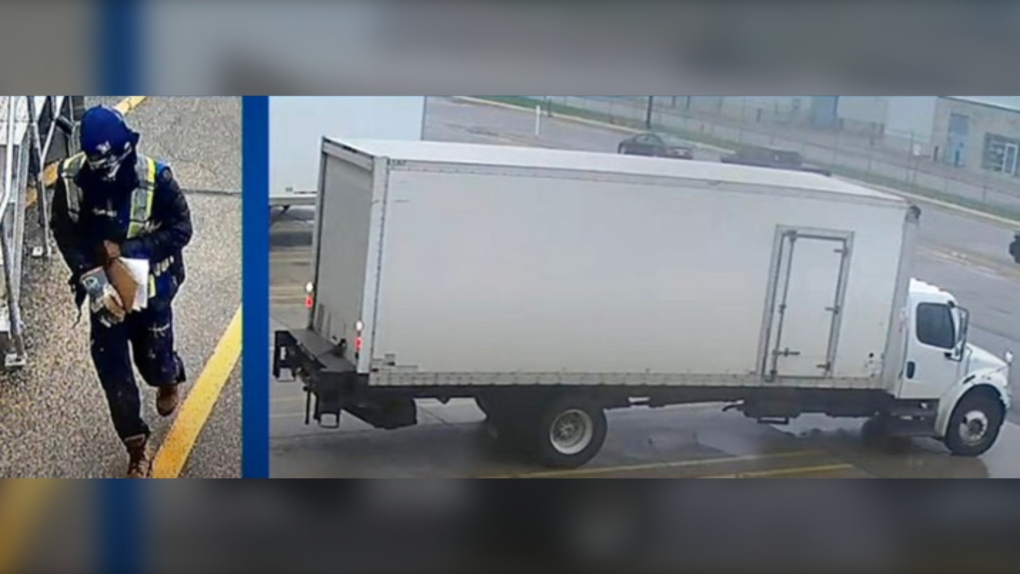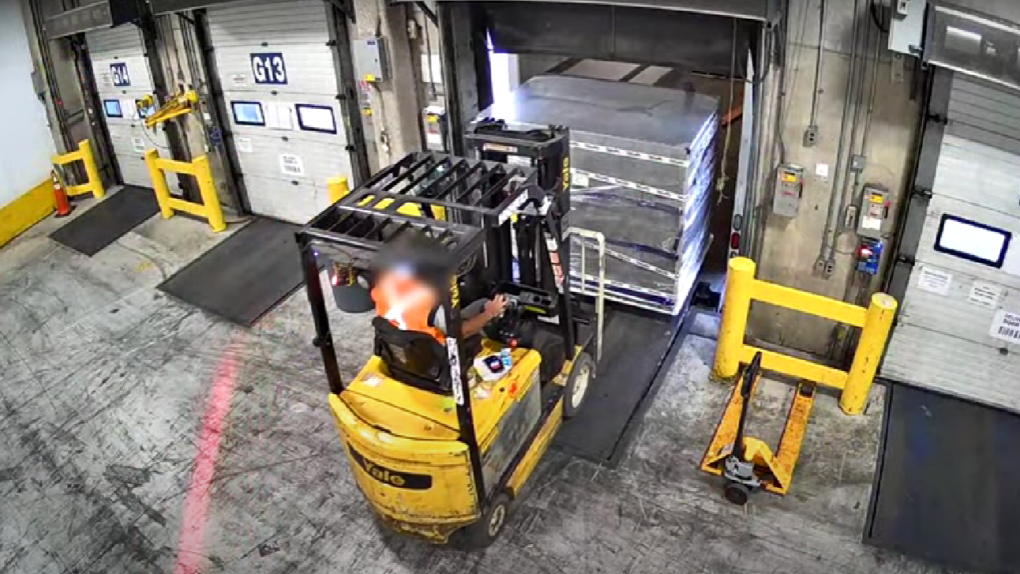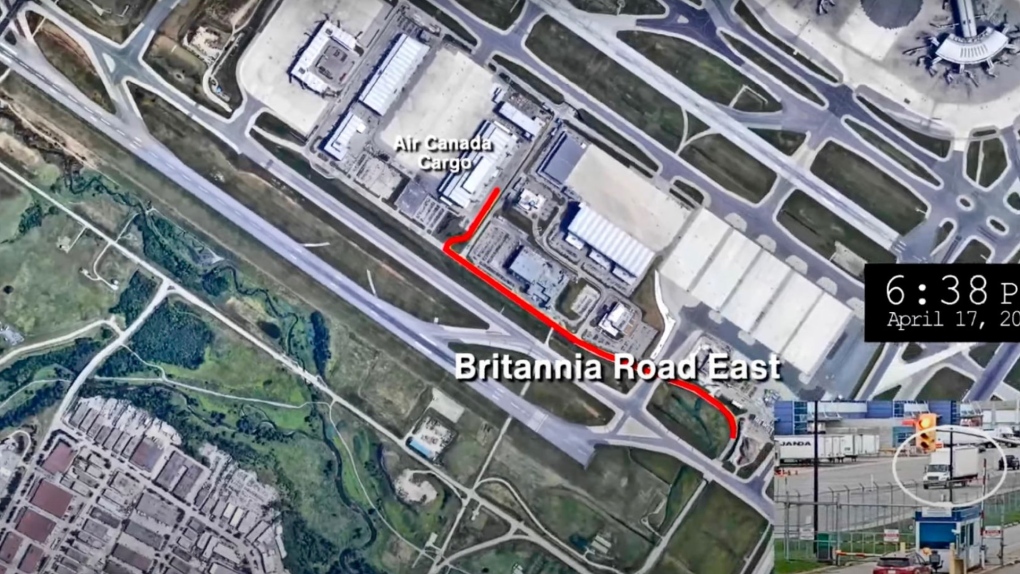Article content
There’s a price shocker coming at the pumps.
Cargill said the High River plant, seen here on April 20, 2020, will process about three million meals with products currently in the facility in order to prevent food waste.
Todd Korol/The Globe and Mail
One of Canada’s largest slaughterhouses is halting operations after hundreds of people connected to the facility were infected with the novel coronavirus and one died from COVID-19, marking the first major shutdown in the country’s food supply chain.
Cargill Ltd. on Monday said it is temporarily closing its meat-processing plant in High River, Alta. The facility churns out roughly 40 per cent of Western Canada’s processed beef and is a key part of the province’s agriculture industry. Alberta has linked 484 cases of COVID-19 to this plant and dozens more at a competing facility.
The president of the Canadian Federation of Agriculture said the closing of the facility is “devastating” for the country’s food system, which is already under strain amid the pandemic. “[The supply chain] normally runs tickety-boo and no one has to think about it,” Mary Robinson said. “These systems are so efficient and so well-run, and as soon as we start mucking around, we’re going to have problems.”
The High River plant is one of several slaughterhouses in North America to close or slow its assembly lines because employees, who work elbow to elbow, have tested positive for the novel coronavirus. Also hit by the pandemic is JBS Canada, one of the largest beef companies in the country. So far, 67 people linked to JBS’s operations in Brooks, Alta., have contracted COVID-19, according to the province. JBS did not return a message seeking comment.
The idling of the High River facility, even temporarily, threatens to cause ripple effects along the food supply chain, both forward and backward. Consumers might see diminished stock and higher prices at the grocery store, and farmers face the prospect of financial hardship. If producers cannot find a processor to take their animals when they are ready for market, they will incur higher feed and labour costs. Some industry groups warn that a backlog of live animals on farms could also prompt producers to make hard decisions around culling some of their cattle.
Jon Nash, the head of Cargill’s North American protein division, said the company has begun the process of temporarily idling the High River facility. “We are working with farmers and ranchers, our customers and our employees to supply food in this time of crisis and keep markets moving,” he said in a statement.
Cargill, a global agriculture company with headquarters in Minnesota, said the High River plant will process about three million meals with products currently in the facility in order to prevent food waste. The firm did not provide details on how long the closure would last. The facility employs 2,000 people who typically process 4,500 head of cattle each day; many of the labourers are temporary foreign workers and immigrants tied to the city’s Filipino community.
Coronavirus guide: Updates and essential resources about the COVID-19 pandemic
Meat-processing companies have taken measures to create space between workers, including erecting individual stalls in cafeterias, but employees for the most part work in close quarters. The job site, then, is ripe for the novel coronavirus, which causes COVID-19, to spread. The union had been urging Cargill to suspend operations to protect its workers.
“It is about time,” said Thomas Hesse, president of United Food and Commercial Workers Local 401, noting there were 38 cases of COVID-19 linked to the plant on Easter Sunday.
The head of the Syndicat Agriculture Union, which represents federal food inspectors, said he sent two letters in the past week to federal cabinet ministers asking them to implement consistent protocols across all processing plants that have sick employees. Fabian Murphy said the union wants facilities to immediately shut down for 14 days after an employee tests positive for the virus. He is also advocating for inspectors and workers to be supplied with personal protective equipment. (Inspectors must be on site during slaughter activities.)
“The [Canadian Food Inspection Agency] is leaving it up to the plants to make a determination of whether they can operate safely or not,” Mr. Murphy said. “I don’t think that’s the right call. … I think the government could have stepped in sooner and taken decisive action.” The CFIA did not immediately respond to a request for comment late Monday night.
Deena Hinshaw, Alberta’s Chief Medical Officer of Health, said carpooling and the coronavirus spreading in households where infected people are unable to isolate from others have played a notable role in the outbreak in High River. Many of the people tied to processing plants with COVID-19 were exposed to the virus before the facilities implemented safety measures, she said.
“We will continue to see new cases linked to this outbreak over the coming days,” Dr. Hinshaw said.
The Canadian Cattlemen’s Association, which represents 63,000 beef farms and feedlots, said Cargill was in touch on Monday to communicate that the plant would be shut down for a “short period of time.” Dennis Laycraft, the association’s executive vice-president, said that while he hopes the slaughterhouse will reopen soon, farmers need to prepare for the possibility that the plant could stay closed for weeks. And each week, he said, adds about 25,000 cattle to the backlog on Canadian farms.
“Every part of the industry is being impacted,” he said in a virtual town hall Monday. “We’re reaching out, literally as we speak, to the government to stress the urgency in getting moving on a number of measures we’ve been presenting over the last number of weeks.”
The association is urging Ottawa to implement what is known as a set-aside program, which would allow farmers to keep their livestock longer and feed the animals a forage-heavy maintenance diet instead of the higher-calorie growth diet that typically precedes slaughter. The program would be reminiscent of the one used during the BSE crisis of the early 2000s, when slaughterhouse capacity was down.
Without a set-aside program to slow down the supply chain, producers could be looking at a half-billion dollars in market losses before the end of June, Mr. Laycraft said.
The diminished processing capacity may also become apparent to consumers when they visit their local grocery store. Ms. Robinson said that while there is meat in storage that can be drawn upon in the short term, those inventories will not hold indefinitely. “The storm is not tomorrow,” she said. “The impact of these decisions being made today are going to be felt in the medium and longer term.”
Now that it is recommended you wear a face covering in dense public settings like grocery stores and pharmacies, watch how to make the three masks recommended by the Centers for Disease Control and Prevention. Written instructions available at tgam.ca/masks
Sign up for the Coronavirus Update newsletter to read the day’s essential coronavirus news, features and explainers written by Globe reporters.
Gas prices have not been this high since August 2022


There’s a price shocker coming at the pumps.
Advertisement 2
Article content
Gas in Ontario, including the GTA, will go up 14 cents a litre overnight for customers filling up on Thursday, says Dan McTeague, the president of Canadians for Affordable Energy.
Article content
“So going from $1.65.9 (per litre) going to $1.79.9,” said McTeague adding the increase will affect the entire province except for northwestern Ontario, which gets its prices from the prairies market.
“That’s the highest level since August, 2022, almost two years ago,” he added.
Recommended from Editorial
McTeague said the reason for the price hike is that stations are switching over to summer-blend gasoline.
“Around this time of year prices go up to reflect the new blend of gasoline, which is more expensive to make,” he explained. “Butane is used in the winter, for gasoline, whereas in the summer it’s alkyaltes. Alkyaltes are extremely expensive.”
Advertisement 3
Article content
“In the winter you want your ignition to start quickly in cold temperatures, you uses volatile butane. You take that out in the summer. That’s a big difference. This is going to be around for awhile and it could get higher,” McTeague said.
McTeague also blamed the rise in gas prices in Canada on the carbon tax increase, the rising price of oil, and the weak Canadian dollar.
“It just makes a bad situation worse,” he said. “It’s just another brick in the wall, another load on the camel’s bank. The cost of denying our resources, blocking pipelines, is one of the most significant reasons why the Canadian dollar is so weak.”
Article content

CALGARY — A wildfire in west-central Alberta that was sparked by a natural gas pipeline rupture is under control, but an investigation into what caused the pipeline to break could take months or even years.
As of Wednesday morning, there was very little fire activity left in Yellowhead County, where a 10-hectare fire burned on Tuesday about 40 kilometres northwest of Edson.
“But for it to be considered extinguished, we’re going to have to hot spot,” said Caroline Charbonneau, area information co-ordinator with Alberta Forestry and Parks.
“That means we’ll have to dig into the ground, look and feel for hot spots, and then douse it with water. And that could take several days.”
ADVERTISEMENT
The fire on Tuesday, which occurred as much of Alberta is dealing with extremely dry early spring conditions, was sparked when a natural gas pipeline owned by TC Energy Corp. ruptured.
There were no injuries, and the fire was never a threat to any surrounding communities. The affected pipeline segment was isolated and shut in and there is no more gas leaking from the pipeline.
The Canada Energy Regulator had inspectors on site Wednesday to monitor the company’s response and the Transportation Safety Board is investigating the incident.
According to CER, there have been 12 natural gas pipeline ruptures in Canada since 2008, and Tuesday’s incident near Edson was the first rupture on that particular pipeline within that time period.
The 36-inch diameter pipe that ruptured is part of TC Energy’s NGTL pipeline system, which transports natural gas from Alberta and northeast B.C. to domestic and export markets. The system spans 24,631 kilometres and connects with TC Energy’s Canadian Mainline system, Foothills system and other third-party pipelines.
The NGTL pipeline system is like a web made up of different lines that have been developed in stages.
In 2022, there was a rupture on a separate part of the system that resulted in an explosion and fire near Fox Creek, Alta. There were no injuries.
A TSB investigation into that incident took more than 14 months, and concluded that the pipeline ruptured due to reduced pipe wall strength caused by external corrosion.
While the primary risk of a crude oil pipeline leak is an oil spill that harms the local ecosystem, natural gas pipeline ruptures can and do result in fires or explosions, said Bill Caram, executive director of the Pipeline Safety Trust, a U.S.-based non-profit organization.
“The chances are extremely high that a molecule of natural gas that enters a pipeline will go through that pipeline without a failure. Pipelines are quite safe, and when you look at incident rates compared to other modes of transportation like rail or truck, they are much less likely to have a failure,” Caram said.
“But what you don’t get a sense of by looking at the risks of pipelines in that way is how catastrophic a failure can be when it does happen.”
According to the TSB, there were 19 recorded incidences of fires related to pipelines in Canada between 2012 and 2022.
The TSB’s most recent report on pipeline transportation safety in Canada states that in 2022 there were 100 companies transporting either oil or gas or both in the federally regulated pipeline system, which includes approximately 19,950 km of oil pipelines and approximately 48,700 km of natural gas pipelines.
That year, there were 67 pipeline transportation accidents and incidents on federally regulated pipeline systems, according to the report.
That number was well below the 10-year average of 112 occurrences, and was also the lowest number of occurrences since 2019, when 52 pipeline accidents or incidents were recorded by the TSB.
The TSB defines a pipeline “accident” as an incident that results in a person being injured or killed, a fire or explosion, or significant damage to the pipeline affecting its operation.
Less severe pipeline events that involve the uncontrolled release of a commodity or a precautionary or emergency shutdown are classified by the TSB as “incidents.”
There have been no fatal accidents directly resulting from the operation of a federally regulated pipeline system since the inception of the TSB in 1990.
This report by The Canadian Press was first published April 17, 2024.
Companies in this story: (TSX:TRP)
Amanda Stephenson, The Canadian Press
Police say one former and one current employee of Air Canada are among the nine suspects that are facing charges in connection with the gold heist at Pearson International Airport last year.
At a news conference Wednesday on the one-year anniversary of the heist, police confirmed that five suspects were arrested and four others are facing charges in connection with the largest gold theft in Canadian history.
Police said the suspects face a total of 19 charges and Canada-wide warrants have been issued for the arrest of three of the suspects who have not yet been apprehended. All of the suspects arrested in connection with the heist have been released on bail, police confirmed in a news release issued Wednesday.
Peel Regional Police Chief Nishan Duraiappah said the heist was “carefully planned” by a “well-organized group of criminals.”
“This story is a sensational one and one which probably, we jokingly say, belongs in a Netflix series,” he said.
Police said 6,600 gold bars were stolen from Air Canada’s cargo facility on the evening of April 17, 2023 by a suspect who arrived at the warehouse in a five-tonne delivery truck.
The gold, along with about $2.5 million in foreign currency, had been shipped to Toronto from Zurich in the hull of an Air Canada plane and was offloaded to an Air Canada cargo facility shortly after the flight landed at Pearson Airport that afternoon.
Police allege that the suspect came into possession of the stolen gold and bank notes after presenting Air Canada personnel with a fraudulent airway bill.
“The airway bill was for a legitimate shipment of seafood that was picked up the day before,” Det.-Sgt. Mike Mavity, the major case manager for the joint investigation, dubbed Project 24K, told reporters on Wednesday.
“This duplicate airway bill was printed off from a printer within Air Canada cargo.”


Brinks Canada, which was hired to provide security and logistics services for the transportation of the shipment, showed up at the facility a few hours later to pick up the items, police said.
According to investigators, when Air Canada employees tried to locate the container, they realized it was missing and quickly launched an internal investigation. Police were notified about the stolen goods shortly before 3 a.m. the following day, Mavity said.
An exhaustive investigation followed, police said, with officers reviewing video surveillance footage from 225 businesses and residences in an effort to track the path of the truck, which has since been recovered.
Mavity said that last summer, they identified 25-year-old Durante King-McLean as the driver of the truck but were unable to locate him.
In September 2023, Mavity said King-McLean was stopped in rental vehicle by Pennsylvania State Police near Chambersburg, Pennsylvania.
“After a brief foot chase, he was detained and troopers located 65 illegal firearms in the vehicle,” Mavity said Wednesday.
According to Mavity, investigators believe that the stolen gold was melted down and sold and the proceeds were used to purchase illegal guns for a firearms trafficking operation.
He said members of Project 24K have been liaising with the U.S. Alcohol, Tobacco, and Firearms Bureau (ATF) with respect to this aspect of the investigation.
Speaking at the news conference on Wednesday, a representative from the ATF said the law enforcement agency believes the 65 guns seized during the arrest of King-McLean were bound for Canada.
While King-McLean is currently in custody in the United States, he is now wanted on multiple charges in connection with the gold theft.
“We are alleging that some individuals who participated in this gold theft are also involved in aspects of this firearms trafficking,” Mavity added.


Two “debt lists” were found by investigators at separate locations during the investigation, police said.
“A common term in drug trafficking investigations, we believe these lists actually show where the money was distributed when the gold was sold by the suspects,” Mavity said.
He said the names on both lists are “consistent” and police are trying to identify all of those identified.


Police said one current Air Canada employee, identified as 54-year-old Brampton resident Parmpal Sidhu, has been charged with theft over $5,000 and conspiracy to commit an indictable offence. A Canada-wide warrant has been issued 31-year-old Simran Preet Panesar, who police said resigned from his position as a manager at Air Canada back in the summer.
“He has been known to us since early on in the investigation. He actually led a tour for Peel Regional Police before we knew his involvement,” Mavity said Wednesday.
He added that police have an idea where Panesar may be but did not elaborate on a possible location.
Mavity said he believes the suspects needed employees on the inside to carry out the heist.
“Because of their position within Air Canada, in my opinion, yeah they needed people inside Air Canada to facilitate this theft,” he said.





iPhone 15 Pro Desperado Mafia model launched at over ₹6.5 lakh- All details about this luxury iPhone from Caviar – HT Tech




Lululemon unveils Canada's official Olympic kit for the Paris games – National Post
Toronto airport gold heist: Police announce nine arrests – CP24
Saudi Arabia Highlights Investment Initiatives in Tourism at International Hospitality Investment Forum
Loblaws Canada groceries: Shoppers slam store for green onions with roots chopped off — 'I wouldn't buy those' – Yahoo News Canada




Venerable Video App Plex Emerges As FAST Favorite – Forbes
Rupture on TC Energy's NGTL gas pipeline sparks wildfire in Alberta – The Globe and Mail
Squatters at Gordon Ramsay's Pub Have 'Left the Building' After Turning It Into an Art Café – PEOPLE
Comments